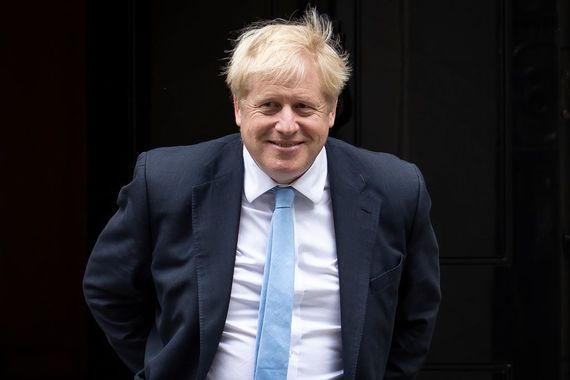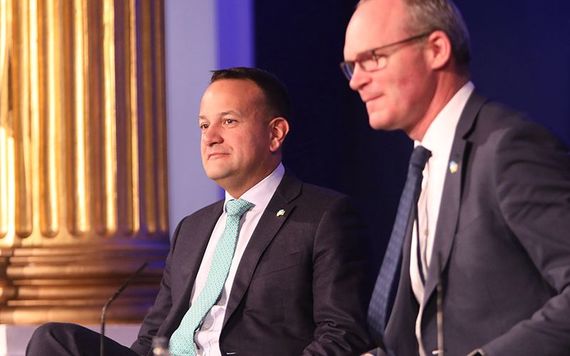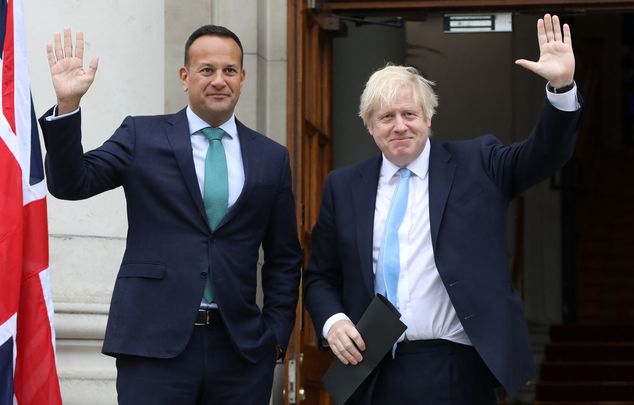The Brexit soap opera has been going on so long -- it's three and a half years now since the British voted to leave -- that over that time it developed an air of unreality. There have been more twists and turns than in the worst soap script.
Three leave deadlines came and went and nothing changed. It began to feel like it might never happen.
That air of unreality is about to come to a swift end, however. Just three weeks from now, on January 31, Britain will finally leave and Ireland will face a new and very uncomfortable reality.
Read more: Why United Ireland vote must be the focus in 2020
Where this will take us in the coming years we don't know. There are many unknowns in what lies ahead. What we do know is that none of them will be good for us.
Having said that, it's important to understand that the implementation of Brexit will not be like flicking off a light switch. Despite British Prime Minister Boris Johnson's impatient call to Get Brexit Done, it's not something that will be instantaneous. It's not a case of Britain slamming the door behind it as it leaves the EU club on January 31.

British Prime Minister Boris Johnson.
What happens on that day -- following approval in both houses of the British Parliament -- is that the legal position on Brexit will make the U.K. leaving a reality. But it also will begin a year-long process during which the U.K. and the EU will attempt to negotiate their relationship for the future, the most important component being trade.
During this so-called transition period, up to the end of December, nothing much will change for people and businesses in the U.K. and the EU, including Ireland. For most of us, there will be no noticeable difference and life will go on as before.
Behind the scenes, however, everything about our future will be changing as the negotiations sail ahead or run into the sand.
There has been a somnambulant calm here about Brexit in recent weeks, ever since the meeting between Johnson and Taoiseach Leo Varadkar ended the threat of a land border in Ireland when the U.K. leaves and substituted it with a border down the Irish Sea. Our worst nightmare had been avoided, and with that came the feeling that the crisis was over and that everything will be fine. But it's not as simple as that, and we could be in for a rude awakening in the coming months.
A clear indication is the way Johnson is sticking to his determination both to have a hard Brexit and to get a trade deal with the EU wrapped up during the transition year. Together these are unrealistic and contradictory aims, which makes failure a real possibility.

Leo Varadkar and deputy leader Simon Coveney.
Johnson has made it clear that although he wants what he calls a comprehensive and fair free trade agreement with the EU, he will not accept one that limits the U.K.'s freedom to do global trade deals after Brexit. That position is internally contradictory.
If the U.K. wants a comprehensive free trade deal with the EU it will have to stick to EU product standards and environmental and labor rules which will mean that it cannot do global trade deals with other parts of the world where very different standards and rules apply. No amount of negotiating or fudging is going to make that reality disappear.
Johnson wants to have his EU cake and also be able to eat at the global table, and there is no way Europe can let him do that. This means that the negotiations, due to start in March, are likely to be fraught from the very beginning and the chances of success are remote. They will not be helped by Johnson’s recent declaration that he has no intention of sticking to EU standards and rules.
Which brings us to the time scale and the second item on his wish list -- to get a trade deal with the EU done this year. Such trade deals usually take more than five years to complete, and all the experts agree that he is being ridiculously optimistic.
Follow IrishCentral's Brexit news here
But to show his determination on completing a deal quickly, Johnson has ruled out asking for any extension of the transition period and is introducing legislation in the U.K. to make that legally binding. This could just be Boris bravado before the talks begin but added to the unreality of what he wants it increases the chances of the U.K. crashing out of the EU at the end of this year with no trade deal in place. And that, as we have said here repeatedly, would be a disaster for Ireland.
Brexit has slipped down the news agenda here in recent weeks, but the problem for us has not gone away. The relief, bordering on euphoria, that greeted the border-in-the-Irish-Sea solution is understandable and it was a significant achievement for Varadkar.
But although it avoids the security nightmare we would have faced with a land border, it does little or nothing to solve the economic problems ahead of us. Wherever the border is we will still face huge difficulties in accessing and competing in the U.K. market after Brexit.
This will be particularly true if there is a so-called hard Brexit, one in which the U.K. diverges significantly from the EU market so that it can do global trade deals. In that case, we are likely to face not just tariffs but regulatory challenges.
In the meat, dairy and wider agri-food sector, for example, how can we adhere to EU standards here and at the same time export produce at prices that will compete in a post-Brexit U.K. market flooded with cheaper produce from around the world?
This would be a far bigger problem, of course, if the negotiations this year fail and the U.K. crashes out of the EU without a trade deal. If that were to happen -- and despite Johnson’s bravado, it's not something he wants either -- it would be a catastrophe for us.
Not only would we face unrestricted global competition but penal tariffs as well. We would take a far greater economic hit than any other EU country.
A no-deal crash out by the U.K. at the end of this year would be a disaster for us, but even a hard Brexit will cause us very serious problems. Thousands of jobs here could be at risk.
Coupled with the predicted steep decline in revenue from corporation tax here beginning in 2021 (detailed in this column last week) the state's ability to cope will be severely tested and we could see a return to the austerity years we endured after the crash.
Read more: Record smashed as close to a million Irish passports issued in 2019
Of course, we are unlikely to hear any of this here in the coming weeks as our politicians position themselves for the upcoming general election. Instead, we will be fed a diet of tax cuts and extra state spending.
The possible Brexit fallout will be swept under the carpet as we are swamped in unsustainable promises. But the reality will emerge soon after the election to bite whoever is in power -- and it will make little difference whether the next government is led by Fine Gael or Fianna Fail.
It's worth remembering that we did have an alternative to all this. When Theresa May was prime minister she favored a soft Brexit, one that would have kept the U.K. as close as possible to the EU market and therefore one that would have caused us minimal damage. She was accused by Johnson and his hardline Brexit chums at the time of pursuing what they called Brino -- Brexit In Name Only.
May's withdrawal agreement proposal was voted down three times in Parliament, and the main sticking point was the open-ended nature of the Northern Ireland backstop which the hardliners believed could have trapped the U.K. in the EU indefinitely. On the third vote, the losing margin was small, and it seems certain that if we had agreed to accept a time limit to the backstop (seven or even five years should have been enough) May would have survived and a very soft Brexit would now be a reality. Instead, we played hardball, May was ousted and we are now stuck with Johnson and what may be a very hard Brexit indeed.
The argument at the time was that any dilution of a permanent backstop was unthinkable. This view prevailed even though a seven-year limit would have given us plenty of time to find other answers to the border problem.
What we are left with now is a solution that avoids a land border but risks an economic meltdown. Whether we made the right choice will become clear later this year.
WATCH: Multiple Irish border crossings on one road shows absurdity of hard border




Comments